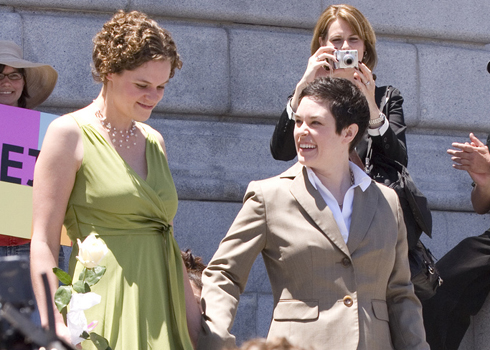A federal judge in California has ruled that Prop 8 — the voter initiative that banned gay marriage — is unconstitutional.
Supporters of Prop 8 (that is, opponents of gay marriage) have already promised to file an appeal. The judge also approved a two-day stay on the ruling, asking lawyers to respond by Friday, when he will decide whether to suspend his ruling pending appeal.
So, for now, same-sex couples in California can’t get their marriage licenses quite yet.
The case is expected to eventually get to the Supreme Court.
From Judge Vaughn Walker’s decision:
Proposition 8 fails to advance any rational basis in singling out gay men and lesbians for denial of a marriage license. Indeed, the evidence shows Proposition 8 does nothing more than enshrine in the California Constitution the notion that opposite-sex couples are superior to same-sex couples. Because California has no interest in discriminating against gay men and lesbians, and because Proposition 8 prevents California from fulfilling its constitutional obligation to provide marriages on an equal basis, the court concludes that Proposition 8 is unconstitutional.
Prop 8, approved in 2008, created an amendment to the state constitution that defines marriage as only between a man and a woman.
[TPM SLIDESHOW: Anti-Prop 8 Protests In San Francisco]
More from Walker’s decision:
In the absence of a rational basis, what remains of proponents’ case is an inference, amply supported by evidence in the record, that Proposition 8 was premised on the belief that same-sex couples simply are not as good as opposite-sex couples. FF 78-80. Whether that belief is based on moral disapproval of homosexuality, animus towards gays and lesbians or simply a belief that a relationship between a man and a woman is inherently better than a relationship between two men or two women, this belief is not a proper basis on which to legislate.
And:
The arguments surrounding Proposition 8 raise a question similar to that addressed in Lawrence, when the Court asked whether a majority of citizens could use the power of the state to enforce “profound and deep convictions accepted as ethical and moral principles” through the criminal code. … The question here is whether California voters can enforce those same principles through regulation of marriage licenses. They cannot. California’s obligation is to treat its citizens equally, not to “mandate [its] own moral code.”
“Moral disapproval alone is an improper basis on which to deny rights to gay men and lesbians,” he wrote.
In his findings of fact, Walker pointed out that California “has never required that individuals entering a marriage be willing or able to procreate.”
He also notes that slaves were unable to marry.
“The states have always required the parties to give their free consent to a marriage. Because slaves were considered property of others at the time, they lacked the legal capacity to consent and were thus unable to marry. After emancipation, former slaves viewed their ability to marry as one of the most important new rights they had gained,” he wrote.
Walker also noted that past marriage inequalities have included the prohibition of interracial marriage and coverture, in which a woman’s identity is subsumed by her husband’s.
The judge excoriates David Blankenhorn, the gay marriage opponents’ primary expert witness who testified that gay marriage weakens the family structure.
“Blankenhorn gave absolutely no explanation why manifestations of the deinstitutionalization of marriage would be exacerbated (and not, for example, ameliorated) by the presence of marriage for same-sex couples,” Walker wrote, noting that “much of his testimony contradicted his opinions.”
He went so far as to throw out Blankenhorn’s testimony:
“The court now determines that Blankenhorn’s testimony constitutes inadmissible opinion testimony that should be given essentially no weight.”
Besides, there is no discernible difference between same-sex and opposite-sex couples:
Same-sex couples are identical to opposite-sex couples in the characteristics relevant to the ability to form successful marital unions. Like opposite-sex couples, same-sex couples have happy, satisfying relationships and form deep emotional bonds and strong commitments to their partners. Standardized measures of relationship satisfaction, relationship adjustment and love do not differ depending on whether a couple is same-sex or opposite-sex.
The full, 136-page ruling:






